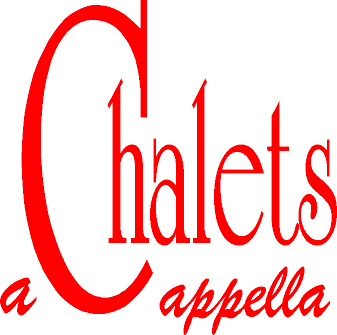

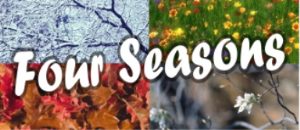
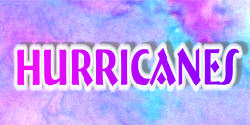
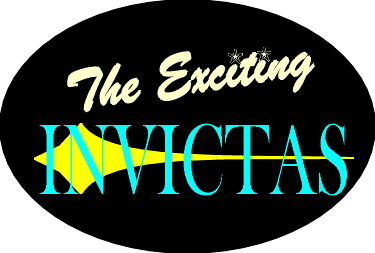
lead singer of the
Chalets tells all!
story as told by
Danny Hicks.
Vernon Britton of
the Hurricanes.

|

|

|

|

|
|
Lenny Hutter lead singer of the Chalets tells all! |
The Continentals story as told by Danny Hicks. |
The original Doo Woppin' Four Seasons! The real story! |
Interview with Vernon Britton of the Hurricanes. |
The history of the Exciting Invicta's as written by John Stehman. |
 first formed in 1956, originating from the corners of the Williamsburg section of
Brooklyn, New York. The original group consisted of ANDY MORAGLIA, DONALD JONES, WILLIE CALIA, PHIL RAO and THOMAS ROCK.
first formed in 1956, originating from the corners of the Williamsburg section of
Brooklyn, New York. The original group consisted of ANDY MORAGLIA, DONALD JONES, WILLIE CALIA, PHIL RAO and THOMAS ROCK.
It has been said that the Chalets auditioned for ABC/Paramount Records and although that connection never materialized eventually they were signed to do two sides for the Tru-Lite label. They did one session, in 1957, which produced "FAT-MOM-MIO" and "WHO'S LAUGHING, WHO'S CRYING".
After the release of this 45, Willie Calia was approached by MGM Records to do solo recordings. Neither the Chalets nor Willie Calia's solo career survived. Although the group did not have major success with the recording, it was successful and in demand enough to be reissued twice in the early 1960's. The reissues were on the DART and MUSICNOTE labels.
After the Chalets had broken up, ANDY MORAGLIA sang with the Blendairs on Tin Pan Alley. Having known LENNY HUTTER from the neighborhood, Andy would occasionally get together with LENNY, FRANK FILLIPONE and STANLEY (last name unknown) to sing for fun. Lenny Hutter was known as the lead singer for the Five Discs on their Yale label recording of "Come On Baby".
Chris Buccola was a regular member of U.G.H.A. and at these meeting became friends with Kenny Robertson - they decided they wanted to get a group together to sing. What they were lacking was a lead - Kenny remembered LENNY from Knickerbocker Park and tracked him down. He asked Lenny to listen to the group and to consider joining them.
In the mean time, Andy had once again called Lenny and arranged to bring the guys over to Lenny's house to sing. Lenny invites Chris & Roberta Buccola over to hear this impromptu group - Roberta joins in the session which last until the wee hours of the morning.
Andy (bass), Frank (second tenor), Stanley (baritone), Roberta (first tenor) and Lenny (lead) had a great sound, but due to circumstances, neither Frank nor Stanley could commit to staying with the group. Andy then enlisted his cousin, Frankie Perna (as second tenor), to join them. Still looking for another member, Lenny enlisted his brother-in-law, Victor Rodriguez (as baritone). This group recorded the jingle for Bill Dogherty's radio show which was broadcast from Adelphi University, Garden City, New York.
When Frankie Perna left the group, they recruited JOE MIRANDA - who had previously been singing with The Endings. With this change, Victor became second tenor and Joe sang baritone. One more major change would take place, Victor would leave the group to be replaced by JOE NOTO. This change would be the last change for a very long time.
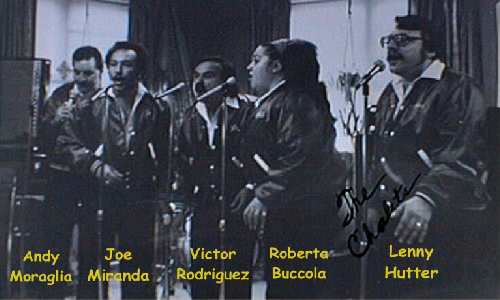
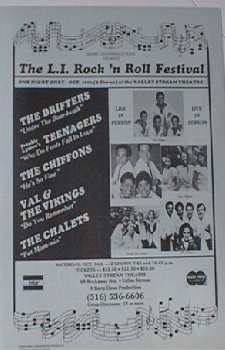 The Chalets were very successful and regularly performed for the Long Island Rock and Roll Association, who would eventually release the Chalets on the L.I.R.R.A. record label. They also performed at many shows, charity functions and fund raisers, as well as numerous nightclubs in the metropolitan area. In 1983, the Chalets auditioned, along with dozens of other acappella groups for Richard Nader and were selected to perform as the opening act at Richard Naders Rock and Roll Revival Show at the Felt Forum.
The Chalets were very successful and regularly performed for the Long Island Rock and Roll Association, who would eventually release the Chalets on the L.I.R.R.A. record label. They also performed at many shows, charity functions and fund raisers, as well as numerous nightclubs in the metropolitan area. In 1983, the Chalets auditioned, along with dozens of other acappella groups for Richard Nader and were selected to perform as the opening act at Richard Naders Rock and Roll Revival Show at the Felt Forum.
Pictured on left:
Advertisement for the L.I. Rock 'n Roll Festival, October 16th, 1982, held at the
Valley Stream Theatre.
Over the next few years, the Chalets recorded four more 45 RPM records. They were:
The Chalets have also recorded various radio show jingles which can still be heard today!
Over the years, as with most groups, there were a number of personnel changes, including the passing of Andy, the Chalets original bass singer. The following people have been members of the Chalets:
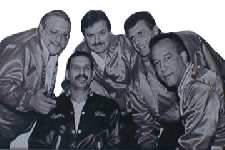 Pictured are (Left to right) LENNY HUTTER, CHRIS BUCCOLA, TONY PENNINO and JOE MIRANDA.
Center FRANKIE PERNA.
Pictured are (Left to right) LENNY HUTTER, CHRIS BUCCOLA, TONY PENNINO and JOE MIRANDA.
Center FRANKIE PERNA.
Photo dated September 1993.
 Joe Miranda was a member of the Tropicals before coming to New York from Puerto Rico
and joining the Chalets. Julio Acevedo was also a member of the Tropicals and formed the LATIN LADS. The Latin Lads have released a CD and as a bonus, four Chalets tracks (first time on CD) have been included in the CD - "Nunca". The Chalets tracks are "Angel Be My Love", "Sincerely", "Walking My Baby Back Home" and "The Girl I Love".
Joe Miranda was a member of the Tropicals before coming to New York from Puerto Rico
and joining the Chalets. Julio Acevedo was also a member of the Tropicals and formed the LATIN LADS. The Latin Lads have released a CD and as a bonus, four Chalets tracks (first time on CD) have been included in the CD - "Nunca". The Chalets tracks are "Angel Be My Love", "Sincerely", "Walking My Baby Back Home" and "The Girl I Love".
Due to various career and personal commitments, the Chalets are no longer performing.
 On July 9th, 2006, the Chalets had a reunion! Memories and stories were plentiful.
On July 9th, 2006, the Chalets had a reunion! Memories and stories were plentiful.
Standing (left to right): Chris Buccola, Joe Noto, Joe Miranda, Lenny Hutter.
Seated: Danny Rinaldo and Frankie Perna.
CD - Released April 2014
• Sweet Talkin With the Chalets
Check out the following videos of the Chalets on youtube:
• The Chalets at Willy's Lounge, NJ on September 17th, 1982
• The Chalets sing 'Who's Laughing' at WRHU, Hofstra Radio
• Chalets at WRHU Radio Hofstra University fund-raiser, February 16th, 1992
• Go Vicky Hutter Go!
The following is an exclusive interview with Lenny Hutter, former lead singer of the Five Discs and lead singer of the Chalets.
We invite you to e-mail your greetings, comments and questions to Lenny, in care of Doo Wop Shoo Bop.
January 10, 1998
DWSB: When and how did you get involved in singing?
LENNY: Oh, years ago when the Alan Freed show first came on the air I was attracted to the music - but I always could sing. I guess it came from my mother and father. My mother sang with Giovanni Martinelli from the Metropolitan Opera Company. Dad also had a pretty good voice. In fact, when I was in grade school, at P.S. 24, about 10 years old, there was a music teacher, his name was Gil Slote who canvassed the school for singers. He picked 8,I was one, to record some songs he wrote. The name of the album was '12 Songs For All Year Round.' We did the Carousel show which was on TV Sunday mornings, the host was Peter Tripp, and that's when I first actually got into singing professionally.
(November 2002, Gil Slote was surfing the web and came across this article in which he is mentioned. Mr. Slote has been in contact with Lenny and has informed him the album is in the Smithsonian Institution and available thru them.)
DWSB: What grade school was that again? Maybe some of your classmates are reading this.
LENNY: P.S. 24 in Brooklyn.
DWSB: Who influenced you? Where did you get your style from?
LENNY: The black groups - listening to the Alan Freed show. At that time the people were calling it the devil's music, they were breaking records and in fact Jack Parr, on TV, said "listen to these lyrics 'ooh la de da da shoop shoop doo wah' - isn't that great folks" and everybody was making fun of the music, but nobody understood that most of the groups back then. Especially the black groups and mixed groups couldn't afford instruments and what they actually were doing with the doo wop and all the backgrounds, they were substituting in harmony the instruments and that's where acappella came from.
DWSB: When did you start singing with groups? And what groups did you sing with?
LENNY: Oh I sang with the Dubonettes, I sang with street groups. My first professional group was the Five Discs and that was 1960-61, which was just after Mario DeAndrate ('I Remember') left the group. I was the second lead singer and this guy Russell was the new bass.
DWSB: Did you record with them?
LENNY: Yes, I did lead on "Come On Baby Let's Rock". The other guys in the group were Beans, Tony, Joe, and Russell. I also did tenor on the flip side "I Don't Know What I'll Do" - Beans did lead.
DWSB: Anything else?
LENNY: Well that day when we did that ("Come On Baby Let's Rock) there was a girl in the studio and she was having a problem and they had asked us to back her up. I don't remember her name, but we did back her up that day.
DWSB: Did you also record with the Dubonettes?
LENNY: Yeah, we did a couple of demo records - "I'm Going To Ask My Baby", "Hungry For Your Love" and "Mr Maestro". I wrote that song "Mr. Maestro" and it was later recorded by The Impossibles - (Joe Pellegrino - who I knew) - but that's my song - I wrote that song.
DWSB: But you didn't get credit?
LENNY: What happened was when we did the demos, the demos must have went into someone else's hands and got to the Impossibles and they put the song out.
DWSB: Have any of the demos ever been released?
LENNY: No, never.
DWSB: Who was in the Dubonettes with you?
LENNY:Tommy Lopez, Nicky, Joe, and Charlie Benuchi.
DWSB: You are most well-known for being the lead singer of the Chalets. How did you get involved with the Chalets?
LENNY: Well, Andy (Moraglia) & I were in neighborhood groups - you had the Fascinators, Clusters and others & we would get together in Knickerbocker Park. People knew these groups sang over here, and they came to hear us sing. Over the years we remained friends even when the groups broke up. Every now and then Andy would give me a call, he'd come over with a couple of guys, open a bottle of scotch and we'd sing all night. When the nostalgia thing hit, we brought the group back together again - me, Andy, Frankie Fillipone, Stanley, sometimes Frankie Perna.
I was contacted by Kenny Robertson, - he was actually the guy that started me back - who called me about going to Chris Buccola's house - they had a group and if I wanted to hear them, see how they sound and maybe join the group. So I went over there, we were a bunch of people downstairs and we hit it off. We sang and it wasn't bad we decided to keep the group together and kept practicing. And in the mean time Andy calls and wants to come over with the guys to sing and I told Chris "You wanna hear some guys that really know how to sing?" So Andy, Frankie and Stanley come over and so does Chris & Roberta & some friends - we start singing together and don't stop till morning. Chris went nuts, he loved us. And that was the Chalets from that time on.
DWSB: Who were the members at that time?
LENNY: Andy Moraglia, Frankie Fillipone, myself, and Stanley.
DWSB: What did you record with the Chalets?
LENNY:We recorded "FAT-MOM-MIO" (acappella version), "SINCERELY", "MY FOOLISH HEART", "WALKING MY BABY BACK HOME", *we did some acappella and some with music.
DWSB: Did you do a lot of performances and what was your most memorable performance?
LENNY: I would say that would be Madison Square Garden and we were nervous as hell, but it had been a long time coming. We had been doing local clubs, nice audiences, very, very good response, but this was a BIG show. 10,000 people. And we got out on stage and we were the opening act. We were supposed to do three songs acappella and when we did the Turbans "When You Dance", after about six bars when the audience stood up and gave us a standing ovation - we felt like, yeah we belong.
Talking about the Garden - we got known as a pretty good group, and there was an
audition that we didn't even hear about until the last minute to be in Richard Naders
Rock and Roll show. There was a contest, we found out late that they were auditioning
a load of groups - about 15-20 groups - so we went down. Little by little they chopped it
down and it came to a group called Charm and ourselves and they decided to take the
both of us. We were there pretty much all day - just singing and singing - it was a process of elimination - let's put this group up then we'll listen to that group, okay we'll cut that group now we'll go to that group - and it got down to the two of us and they took us both, It was exciting, a little nerve racking because it was like a competition and slowly it came down to the Chalets and Charm and they couldn't really pick between the two of us so they picked us both! And that's how we got to do the show.
It was an exciting two nights. I remember the last night when we came off stage, we
looked at each other like "yeah we did it and they can't take that away from us". We walked out and went across the street to the local bar that was there and the Duprees were in there, they were on the show with us. They sat at one end of the bar and we sat at the other end of the bar, so I don't know how it happened but the Duprees started to sing and they looked over at us and so we sang a song, then they sang a song, then we sang a song, and all of a sudden this bar was jam-packed with people and the bartender said "keep singing - I'll give you all the drinks you want for nothing!" And we stayed there till about 4 o'clock in the morning. Then we all piled into Chris' car and went home.
DWSB: I hope it wasn't the Mazda!
LENNY: Nope.
DWSB: What's your favorite song?
LENNY: Oh there are a number of them. I couldn't really put my finger on one, but I love the Solitaires, Harptones, Flamingos material.
DWSB: What song do you like to perform the best?
LENNY: I would have to say "My Foolish Heart".
DWSB: I've seen you perform and practice thousand of times - I have to ask you when did you notice that your memory was lapsing and you started to make up words to songs - which you do quite well, by the way.
LENNY: What had happened was you'd go up on stage or be in a club and for some reason you get nervous and for a split second you'd forget the words and I was always told no matter what keep going - so if I had to throw in a word here or there I did it - but the song got over. I was always ribbed by the guys for it, but as long as you keep going it was okay. Back then with the recordings, it was very hard to decipher the words off some of the 45's - it had to be crystal clear to get the words or you needed sheet music to get the words. I'd throw anything in there not to stop.
DWSB: There's a new CD out called "Nunca" Julito & the Latin Lads. There are four Chalets tracks on there. Have you heard it and what do you think?
LENNY: I think it's great. Our recordings on there sound pretty damn good. I sing lead on all of them. I have to give Chris Buccola a ton of credit because he schlepped around with us when we did all these things and he set up the mikes, did this and that, did all the bookings - no one else in the group could have handled that. He also, later did tenor for us. He has raw talent but he got up there. I was proud to have sang with him. These people have become my dear friends - I love them all!
And my wife, Vicky played a big part in my success - she kept track of where and when we had practice and shows, what we had to wear - I didn't know where we were singing from one week to the next - but she knew. Amen!! Rock and Roll Forever!
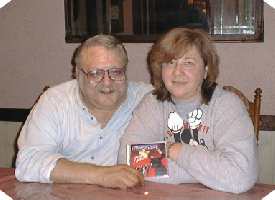
Lenny's only request during this interview was that the caption for this photo must read:
Lenny and the Latvian
A Very Special Thank You to LENNY HUTTER!
Please click here to view the Lenny Hutter Tribute Site .

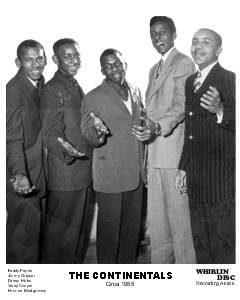
They formulated a ten song repertoire made up of two original songs ('Dear Lord' and 'Fine Fine Frame') and eight 'cover songs' (material originally done and recorded by others) for which they became well known - because of their ability to 'do the songs better than the artists who had originally recorded the tunes'. Vinny was the musical director, Gripper was the choreographer (and the best dancer); Buddy, Herman and Danny handled the lead and background vocals.
It wasn't long before they began entering local talent shows and singing at local functions like parties, picnics and as 'after the game' entertainment. At one appearance, formerly Girls High School, in Brooklyn, they were so well received that they literally needed the police to help them get out of the building after the show. It was that show that set the tone for their subsequent popularity in New York. Then they set out to find a record deal. But before they were able to find a record deal, Buddy Payne left the group and joined the U.S. Marines. At that point, John 'Peanut' Jones joined and became an important part of the group.
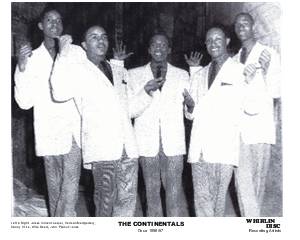
Finding a good record deal has never been easy; and, in 1956 finding a record company that would listen to you was even more hectic than it is now. In those days, an aspiring singer or group/band had to do 'cold auditions'; which consisted of performing the songs a cappella (without the benefit of musical accompaniment), in an office or a dingy club or perhaps an auditorium. Needless to say, they became good at singing without music. So good in fact, that they were signed to a recording contract after their first audition. The problem was that it turned out to be a very bad deal for the group and they were relegated to second priority with the label and were seldom promoted by the label's owners. But despite the lack of exposure by the record company, they continued to prepare themselves for future stardom.
The Continentals recorded for the Whirlin' Disc Record label. The recordings were:
Their music became ever more advanced as they continued to expand their ever-growing repertoire. They became so accustomed to each other and so well rehearsed that they did not need notes to help them remember the names of the songs in that repertoire - they simply called out a number. They gave each song title a number and remembered their individual roles in each song by its number. For example, 'Dear Lord' was #1 and 'Fine Fine Frame' was #2. So when someone said '#25!' they knew that meant they were going to sing 'Why Do You Have To Go?' and so on. By the end of 1956 their song list had almost reached 50 well rehearsed songs. When asked why they practice so much, Vinny remarked, 'Because practice makes perfect. And that's what we want to be. Perfect.'
Vinny Cooper, bass singer/bassist, was something of a musical genius. While still in high school, he was a member of New York's prestigious All City Chorus and a scholarship student at world famous Julliard School of Music. So, in addition to his classical background, Vinny loved modern jazz, blues and doo-wop music. Vinny was a renaissance man, well ahead of his time. He was most responsible for the group's innovative approach to music; which eventually led them to the world famous Apollo Theater in Harlem.
The Continentals influenced many groups of their generation and beyond, witnessed by comments from several 'rival' groups members. Without name dropping, one famous singer/song-writer said upon meeting Danny Hicks, and realizing that Danny was a former member of The Continentals, 'Gee I always wondered what ever happened to you guys. I heard y'all at a theater in Brooklyn when I was in New York visiting some relatives. My cousin hipped me to y'all and we went to see the next show. Boy! We were blown away. I had never heard such tight harmony; and your vocals were just great. But then you guys seemed to have disappeared. What happened?' Danny only said 'It's a long and familiar story, man. Too painful to talk about.' Another member of the famous R&B group said 'There are a lot of groups out today (in the year of 2000) who owe their successful harmonies to you guys. But they don't know it. Before the Continentals, nobody ran the scales; no group had a baritone who could ad-lib; you guys had a bass singer who could sing lead in three octaves and three main lead singers (Buddy, Herman and Danny - and later Peanut) who had different styles; you guys even used octave harmony and that was unheard of back then. I know things didn't work out, but y'all have nothing to feel bad about. We owe you a debt of gratitude for the work you guys left behind'. And so it goes.
One by one the original members left the group and they finally, sadly disbanded in 1958. James Gripper joined the U.S. Air Force before Willie Keels joined the group. But, in 1958, Vinny Cooper suddenly passed away. The guys were devastated. And although they tried valiantly to hold things together, they called it quits at the end of the year. Herman and Danny joined other groups; Peanut joined the U.S. Army and Willie seemed to vanish from the face of the earth. Then, in 1999, Herman passed away, leaving James 'Jimmy' Gripper, John 'Peanut' Jones, Buddy Payne and Danny Hicks as the surviving members of this once talented quintet. But the years have been kind to these four remaining members of the group.
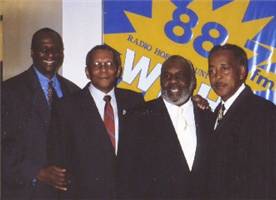 Photo: The Continentals - October 2003. From left to right: John 'Peanut' Jones, Buddy Payne, Danny Hicks and Jimmy Gripper.
Photo: The Continentals - October 2003. From left to right: John 'Peanut' Jones, Buddy Payne, Danny Hicks and Jimmy Gripper.
Peanut went on to a very successful and outstanding military career in the U.S. Army National Guard, where he eventually rose to the office of Brigadier General (ret.). Jimmy Gripper retired from the State of New York after 25 years, as a Supervising Electrician in 1998. During this period, he was elected as the first black Regional President of the Civil Service Employees Association (CSEA/AFSCME) representing over 42,000 state workers located within the five boroughs of New York City. Buddy became an influential property owner (in New York and Georgia). Danny continued in show business as a performer until 1970, when he became a social and political activist and local businessman. He is still involved in show business as a consultant to aspiring artists.
Although their career was short lived, the surviving members have remained friends and remember with great appreciation the love and respect their fans have shown over the years. Because of those loyal fans, even after almost 50 years from that fateful night in 1955, their music is still being heard on 'old goldies' shows all over the country. They are still regarded as one of R&B's pioneer doo wop groups. And along with a whole host of others, are fondly remembered for their work, dedication and innovation.
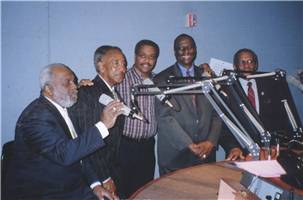 The Continentals appeared on the 'Sunday Serenade' radio program on Hofstra's WRHU station in October 2003. From left to right: Danny Hicks, Jimmy Gripper, Earl Lewis (of the Channels), John 'Peanut' Jones and Buddy Payne.
The Continentals appeared on the 'Sunday Serenade' radio program on Hofstra's WRHU station in October 2003. From left to right: Danny Hicks, Jimmy Gripper, Earl Lewis (of the Channels), John 'Peanut' Jones and Buddy Payne.
CD Discography
(Click on titles to view complete track listings.)

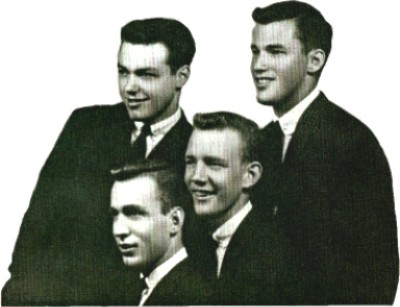
The group came to New York City to record for Bill Lawrence, owner of the Alanna record label. As they were walking to the studio with their arranger, Lenny Martin (the same Lenny Martin who arranged for the Skyliners), they went past the world-famous Four Seasons Restaurant. Lenny said that should be the name of the group & so it was!
The group recorded three 45rpm records:
From the writers credits, 'Don't Sweat It Baby', 'That's the Way the Ball Bounces' & 'Love Knows No Season' we conclude were written by members of the group.
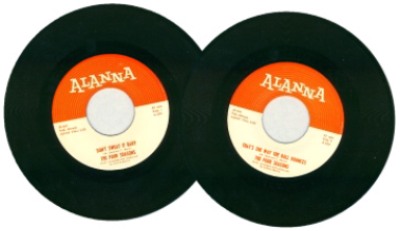
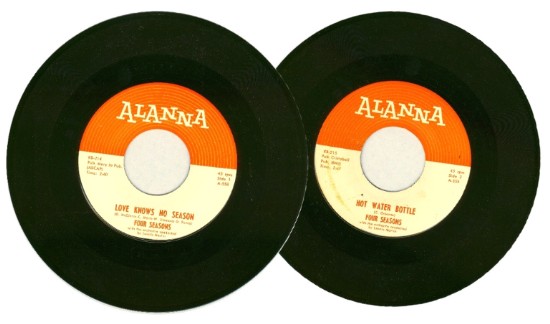

Around 1950, in the Bedford-Stuyvesant section of Brooklyn, NY, Vernon Britton, Sam Fickling, Fred Williams and Jerry Halfhide formed a group. During the very early days Kenny Drye was also a member as was Garbriel Gil. They called themselves the Tune Toppers. The group was influenced by the Orioles, a group popular at the time.
Fred's uncle was Mack "Jelly Roll' Jones, of the comedy team of Jelly Roll and Zu Zu. He became the Tune Toppers manager. Jelly Roll obtained a contract for the group at Jubilee Records, where they found out there was another group called the Tune Toppers. To avoid any conflicts the Tune Toppers became the Toppers.
This photo is one of the earliest photos of the Tune Toppers. Shown, left to right, Kenny Drye, Vernon Britton, Gabriel Gil, Freddie Williams, Sam Fickling. Center, with guitar is Jerry Halfhide. As with most groups, often changes were made for various reaons. Ken Drye began a solo career as 'Kenny King'. Please see 'publicity photo' of Kenny Drye as Kenny King at end of this section. Photo couresty of Ken Drye.
Since he was a well-known performer and had connections, Jelly Roll was able to obtain a contract with King Records for the Toppers. They went on to record for King Records, but King Records didn't like the name Toppers and so they became the Hurricanes. In addition to recording as the Hurricanes, they also did back-up sessions - most notably for Jerry Dorn - for which they did not receive any credit.
The Hurricanes got the opportunity of a life-time when Jelly Roll got them a spot in a movie - Rockin' the Blues. The movie was filmed in Harlem at Sunset Studios. The comedy plot-line was of two guys attempting to sneak into a show - the Hurricanes were to be one of the acts performing at the show. They performed two numbers - 'You May Not Know' and 'Army Days' (both which appear on the soundtrack, although 'Army Days' is listed as 'I'll Be Glad'). The movie premiered at the Apollo Theater, October 1956.
Disillusioned with King Records after the last King recording session, Jelly Roll introduced them to Jerry Field's Skyline Records. In November of 1958, they released 'Once In A Beautiful Lifetime' backed with 'I Dare You Baby'. These recordings were labeled as Henry Alston, which was Henry Austin and he was backed-up by the Hurricanes. Later Skyline re-released it with the flip of 'What Is There Left For Me'.
Soon after, the Hurricanes became acquainted with Bill Lasley who originated the Memo Records label. He convinced the Hurricanes to become the Memos. Three 45rpm records were release on the Memo label. It was after this that the group disbanded for a variety of reasons.
According to Vernon Britton, all the following people were, at one time, associated with the Toppers, Hurricanes or Memos.
Discography
CD Discography
HALL of FAME Award Ceremony honoring the Hurricanes
This award establishes recognition for pioneer vocal groups for their overwhelming influence in the evolution of music. The Hurricanes, formed in the 1950's, definitely were a pioneer group that contributed to the popularity of vocal group harmony.
Congratulations on a well deserved award!
Check them out in their younger days!! See the Tune Toppers photo (courtesy of Ken Drye) at the beginning of the Hurricanes biography.
We invite you to e-mail your greetings, comments and questions to Vernon, in care of
Doo Wop Shoo Bop.
January 23rd, 2001
DWSB: Where & when did you first start sing?
DWSB: How many members in the Toppers when you started?
DWSB: How did you get to record for Jubilee?
DWSB: The Toppers recorded 'Baby Let me Bang Your Box' on Jubilee, correct?
DWSB: So you recorded as the Toppers on Jubilee. How did you become the Hurricanes on King?
DWSB: Whose idea was it to do 'Little Girl of Mine'?
DWSB: Did you do back up work?
DWSB: Did you do the back up at the same time in the studio?
DWSB: Was the band in the studio at the same time too?
DWSB: So you were the opening act for 'Jelly Roll and Zu Zu'?
DWSB: Your stage presence - do you think that had a lot to do with the Hurricanes getting a part in the movie 'Rockin the Blues'?
DWSB: Where was the movie filmed?
DWSB: How did you like making the movie? What are your memories of making this movie?
DWSB: How many days did you work on it?
DWSB: Not like today's productions, did you at least get lunch?
DWSB: The Hurricanes did two songs for the movie, correct?
DWSB: Those two songs were never released other than the movies?
DWSB: Who were the major influences for you when you started singing?
DWSB: What's your favorite Hurricanes song?
DWSB: I noticed on the records that you have a lot of writer credits.
DWSB: How did the group decide what songs you were going to record?
DWSB: How did you go from being the Hurricanes to being the Memos?
DWSB: Eugene Williams, not Fred is listed as a member of the Memos - is this correct?
DWSB: Although the Memos were basically the Hurricanes, the recordings on Memo don't sound like the Hurricanes.
DWSB: Where were these songs recorded?
DWSB: I read somewhere that the Memos did a year long tour of Canada. What was that like?
DWSB: After the Memos disbanded, did you sing with another group?
DWSB: Were you surprised at how many people knew the Hurricanes and of you when you were at the WRHU marathon?
DWSB: We thank Vernon Britton for sharing his memories of the Toppers, Hurricanes and Memos.
Ken was a member of the original Tune Toppers. Pursuing a solo career, Ken left the group before they recorded on Jubilee Records. Ken's 'stage name' was Kenny King (a coincidence the Toppers recorded on the King label when they became the Hurricanes!) Ken performed in theater and says he is still singing today!
Thank you Ken for sharing your photos!
Thanks to John Stehman, the tenor sax, of the Exciting Invicta's for this insightful look at this premier group and for the group photo and 45rpm photo!
The Exciting Invicta's left to right: Donny Humble, Bill Brumbaugh, Ron Brennan, Jimmy Noonin (lead), John Stehman (tenor sax), Jim Hurst (drums) and Emmett Smith (organ).
The Exciting Invicta's group was formed in 1960 and based out of Middletown, PA, although Emmett Smith and myself were from Steelton, PA.
I joined the group in 1961 after several friends told Emmett that I played a mean sax and the Invicta's just happened to be searching for a tenor sax player to fill out the band. I had to audition with the group and my ability to 'play by ear' and being able to immediately pick up on their songs got me the job.
Our weekly rehearsals were held in Middletown at a friend of the group's house, in the basement. We had over 100+ songs in our repertoire and back up and lead were all good singers and dancers. Each of the lead singers also had several favorites that they sang lead on including songs like 'Mother-In-Law' and 'Big Boy Pete'. We even had a few polkas in our bag of tricks for the folks when we played at wedding receptions!
The guys in the band spent a lot of time teaching me to dance, which was no small feat. Looking back today, I would probably have a good laugh watching myself attempting to do the splits and complex routines that were required in those days.
We played throughout PA and NJ at many places including: White Oaks Park in York, PA - a really great place for dancing to rock'n'roll, VFW's, American Legion Posts, colleges, the Hershey Ballroom, etc. We had a strong following of fans and especially enjoyed being in 'battle of the bands' events with other contemporary groups like the Endells and Thundering Century. I cannot recall a single weekend when we were not booked solid.
We had a big 50's vintage black paneled truck that we used to haul all of our equipment and some band members as well. Those darn organs and Leslie speakers were pretty heavy! I think the truck was a Ford or Chevy but the main thing is that it was paid for and 'The Exciting Invicta's' was brightly painted on both sides.
In 1962, we were discovered by Jamie Rowley, representing the Kingston record label out of Reading, PA and were asked to consider cutting a record.
Emmett Smith wrote the music and lyrics to 'I Don't Care' and Jimmy Noonan did an excellent job as lead singer. Jimmy could really hit the high notes in songs like 'Two Kinds of People' by Little Anthony and the Imperials. The recording experience was both scary and exciting as none of us were sure what the final product would sound like. For some reason, during the recording, I could not hear the singers - only Emmett on the organ. Luckily, it turned out fine. I was just sixteen at the time, but already had been playing the saxophone for 9 years. The flip side of our record was a cha-cha titled 'Not Again' and it was very popular because of the compelling dance beat.
To the best of my knowledge, we sold and/or distributed about 5,000 records in the East coast, but those were the days of disc jockey payola and we did not have money for a nationwide campaign with the big radio stations. Our manager, Ed Smith, took care of most of the details while we concentrated on our music. However, WEZN, a radio station in Elizabethtown, PA and other local radio stations gave us fair play because they liked our music and knew we were unable to come up with the $10,000 needed to get things rolling for a nationwide promotion. Things might have been different if we would have had
the money - but that is the way it was in the early 60's."
We also served as backup for several well-known groups including the Drifters and another popular local group from Hanover, PA - named the Pixies Three (hit song was 'Birthday Party').
It is a thrill to know that an Invicta's song now appears on the 'Dynamite Group Sounds - Volume Seven' and is a part of a rock'n'roll legacy.
Hopefully, the 40 years since I performed with the Exciting Invicta's has not caused me to forget any key facts although I am no longer sure about the exact spelling of last names. One thing for sure, because of the Exciting Invicta's, rock'n'roll remains in my soul and I would gladly do it all over again!
If you know of any members of the Exciting Invicta's, please email John.
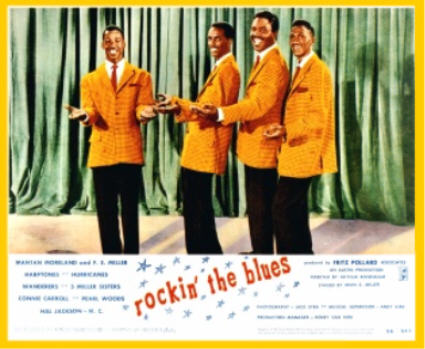
Pictured left to right; Henry Austin, Fred Williams, Vernon Britton & James Brown
Jubilee 5136 - 1954. Henry Austin lead on both sides.
King 4817 - 1955. Side A Henry Austin lead; side B Henry Austin/Vernon Britton lead.
King 4867 - 1956. Side A Henry Austin lead; side B Henry Austin/Fred Williams lead.
King 4898 - 1956. Side A Henry Austin lead; side B Henry Austin/Fred Williams lead.
King 4926 - 1956. Side A James Brown lead; side B Henry Austin lead.
King 4932 - 1956. Back up Jerry Dorn - no label credit.
King 4947 - 1956. Side A James Brown lead; side B Henry Austin lead.
King 5018 - 1957. Henry Austin lead both sides
King 5042 - 1952. Both sides lead done by all.
Skyline 500 - 1958. Henry Austin lead both sides.
Skyline 551 - 1959. Henry Austin lead both sides.
Memo 5000/5001 - 1959. Henry Austin lead both sides.
Memo 34891 - 1959. Henry Austin lead both sides.
(Click on titles to view complete track listings.)
On May 5th, 2001, the Hurricanes were honored by UGHA (United in Group Hrmony Association) with an award and induction into the Hall of Fame. The inductees for 2001 also included Otis Williams & the Charms and Johnny Bragg & the Prisonaires. The following pictures were taken at this celebration.
Lead East 2003
The Hurricanes
perform at the Sunday night concert.
Exclusive Interview with VERNON BRITTON
VERNON:I first started singing around 1949. The group originated with myself, Fred Williams, Jerry Halfhide and Kenny Drye. We sang at places like the Eastern Parkway Arena. At that time, the only thing we needed was a bass voice. The crowd would wait to hear that one bass line. We were called the Tune Toppers. We had some personnel changes in the beginning too.
VERNON:5 guys with the piano player. Gabriel Gil was the piano player. The other members were Sam Fickling, Jerry Halfhide, Fred Williams and me. Kenny Drye wasn't in the group very long - he never did anything in concert or record with us.
VERNON: Jelly Roll - he was Freddie's uncle - had a comedy act called 'Jelly Roll & Zu Zu'. He knew we wanted to form a group and he said he would bring us around to places he played. He was a good act and we were really more famous for our stage presence than records. The records never really made it big. He knew people in the entertainment business and got us a contract with Jubilee.
VERNON:Yes, we tried to get naughty. 'Baby Let Me Bang Your Box' was written with a double meaning. You couldn't just say things back then. The members who recorded that were Henry Austin, Fred Williams, Sam Fickling and myself.
VERNON:First we were the Tune Toppers, it was too close to a group already performing and so we became the Toppers. We became the Hurricanes because we didn't want any problems with any groups with names too similar to what we were using.
VERNON:Probably mine - most of the ideas as to what to do and the type of songs to do was my influence. I've always believed in the music business that one thing follows another. In other words, if one group makes a monster hit and you come out with anything similar to it, it'll hit - that's always been my idea.
VERNON:Yes, we backed up Jerry Dorn, Little Willie John and many others - I don't even remember them all. Sometimes we didn't even know the name. We didn't get credit for all of our back-up work either.
VERNON:No, we usually did the tracks and then they did the leads over it. We only did our songs, the Hurricanes songs, straight through. We started our songs from the top to the finish - just straight thru sometimes in one take.
VERNON:Yes, usually a four piece band - a stand-up bass, and that type of thing.
VERNON:Yes and we traveled alot. The East Coast, Norfolk, Washington DC, Howard Theatre in Baltimore and worked on shows. We took the lead act alot. We had a good stage presence and rehearsed our parts. That's how we managed to make money and also travel around alot without a hit record. Jocko played our records sometimes.
VERNON:Yes, also Jelly Roll. He knew a lot of people in the business.
VERNON:It was filmed in Harlem. The actual person who produced this was Archie Moore's wife.
VERNON:It was fun. Actually we formed this group in order to get a lot of girls and during that movie there were so many girls on the show it was like a heaven as far as we were concerned! Matter of fact, Linda Hopkins became very big, the Miller Sisters and of course Mantan Moreland was already a star.
VERNON:We just went there and did the whole thing in a couple of hours.
VERNON:We were too busy chasing girls to eat. We didn't make a lot of money but we had a lot of fun!
VERNON:Yes, we did two songs, one which was written right on the set. They wanted one similar to Clyde McPhatters 'Whatcha Gonna Do', so we took part of that tune and changed it around our way. As a matter of fact, Henry sounds like Clyde McPhatter & that's why they wanted him to come out with something close to that. Fred does the other song - the Army song.
VERNON:No, never released.
VERNON:The Orioles, they were the only group out there - they were the first of the singers. We used to go to the Apollo and see Sonny Til knocking people out. He had this way of standing to the mike and he did this sort of lean-over thing and girls just loved it - and so that's what we said we wanted to do!
VERNON:I used to like songs like 'Pistol Packin' Mama'. My influence is what caused them to do that song. But I think the prettiest upbeat song was 'Yours'. (Vernon proceeds to sing a few bars for us!) We did it with a Spanish interlude - it was very pretty.
VERNON:Yes, a couple of them - 'Dear Mother' & 'Tell Me Baby'. Gil, on the writers credits was the piano player. He was the arranger - he was very talented.
VERNON:I was a major influence on the type of songs that we would record. Matter of fact, at the time we were recording, I didn't like anyone doing lead except Henry. And of course we had arguments about that and so we gave a couple of leads to Fred and another one to James Brown who we called Sharkey.
VERNON: Bill Lasley was the label owner of Memo and he didn't want to have the Hurricanes name on his label, I don't know why. I guess he wanted a group named after the label - so we became the Memos on Memo. The two songs on the Memo label did more than all of our other songs.
VERNON:Yes, when Fred went into the Army, his brother Eugene came into the group. The other members were still James Brown, Henry Austin and myself.
VERNON:Henry has the type of voice that he could imitate any singer out there. His favorite person was Nat King Cole and that's how he did this - a cross between Henry & Nat Cole. If you listen to the phrasing you'll hear it.
VERNON:Most of them were recorded at Bell Studios in New York. They were one of the only ones around at the time. It was a four track studio.
VERNON:Wrong - everything we did as the Memos was done regionally from here to Washington, DC. The Hurricanes went to Canada.
VERNON:No that was it. I produce now - The Crown Heights Affair.
VERNON: I'm glad of that - I want my name remembered as being someone in the music business, doing good in the business.
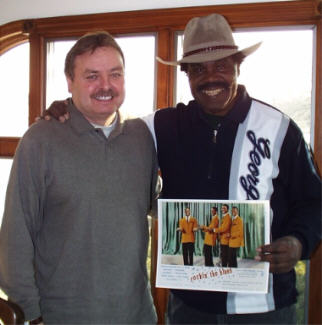
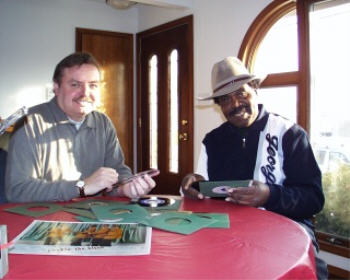
Chris & Vernon talk 'Hurricanes'!
Official publicity shot of Ken Drye as 'Kenny King'.
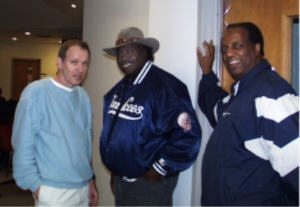
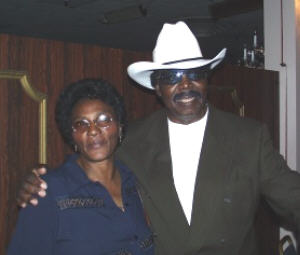
Left Photo: Gordon Skadberg, host of WRHU Sunday Serenade, with Vernon Britton & Fred Williams, at the WRHU Fund Raiser. Tune into WRHU 88.7FM, Sundays 4pm to 6pm.
Right Photo: Dottie & Vernon Britton, celebrating the Hall of Fame award for the Hurricanes.
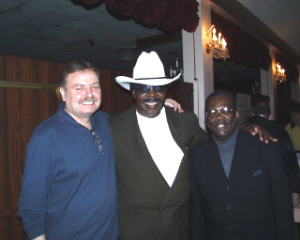
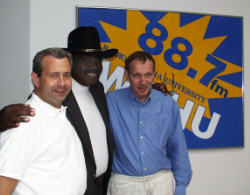
Left Photo: Chris, Vernon & Ken enjoy the Hurricanes induction ceremonies at UGHA.
Right Photo: Vernon with Frank Gengaro & Gordon Skadberg, hosts of Sunday Serenade.
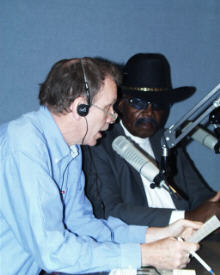
Gordon interviews Vernon on May 27th.

The Exciting Invicta's
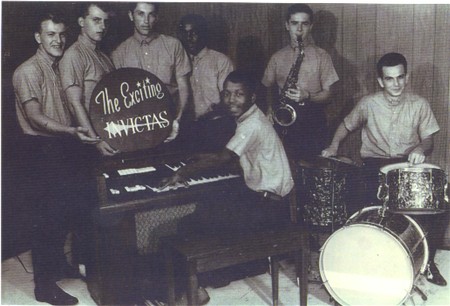
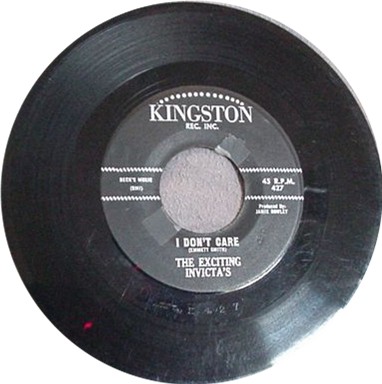
HOME/INDEX
TO ORDER - FAQ - FYI
E-MAIL US
Not to be duplicated, reproduced or otherwise used without permission.